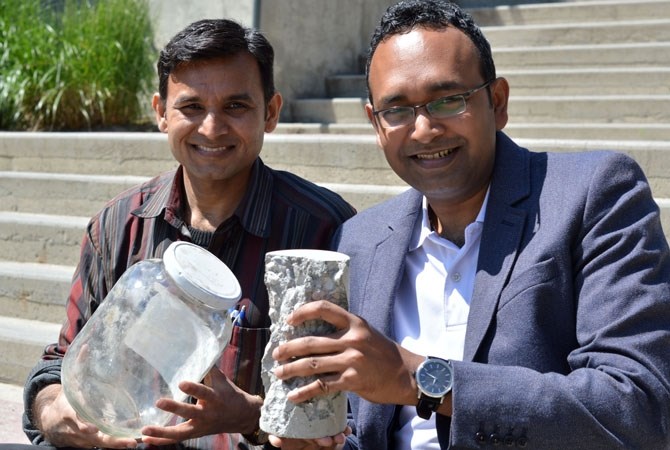
UBC's Anant Parghi (left) and Shahria Alam hold up a piece of 'green' concrete and some of the glass that helped make it.
Image Credit: Contributed
May 25, 2016 - 10:45 AM
KELOWNA - Researchers at UBC Okanagan say they have found the cure for a problem that has kept the construction industry from utilizing millions of tons of recycled glass.
'Concrete cancer' is a condition that causes concrete made from glass to weaken, expand and crack, but a team of researchers at UBCO say they’ve found a way to calm the chemical reaction that causes it.
“Researchers have been looking for a long time for ways to reliably make use of glass in concrete construction, and we believe that this research represents a significant advancement in that search,” Assoc. Prof. of Engineering Shahria Alam says.
Alam says engineers have been trying to find new ways to give the construction industry the resources they need without taking them from the ground.
“By partially replacing cement with polymer, fly ash and glass powder, we were able to produce concrete that was more than 60 per cent stronger than what was previously believed possible,” co-researcher Anant Parghi says. “Though further testing is needed to assess long-term stability, it now looks like we can replace up to 25 per cent of the cement materials that had to be mined for cement production with glass.”
According to a release from the university, all of the glass used in the study was taken from the landfill in Kelowna and the concrete additives were donated by Kelowna-based company POLYRAP Engineered Concrete Solutions.
The results of the study were published in the journal Construction and Building Materials.
To contact a reporter for this story, email Adam Proskiw or call 250-718-0428 or email the editor. You can also submit photos, videos or news tips to the newsroom and be entered to win a monthly prize draw.
We welcome your comments and opinions on our stories but play nice. We won't censor or delete comments unless they contain off-topic statements or links, unnecessary vulgarity, false facts, spam or obviously fake profiles. If you have any concerns about what you see in comments, email the editor in the link above.
News from © iNFOnews, 2016